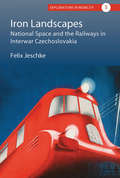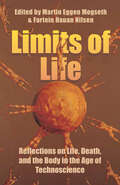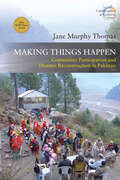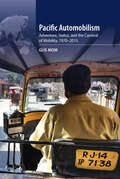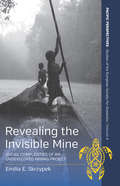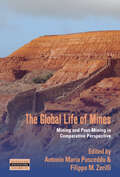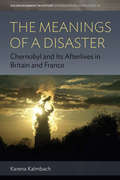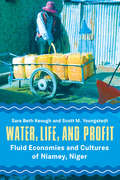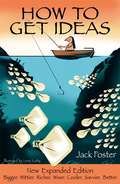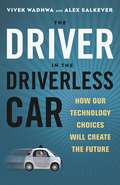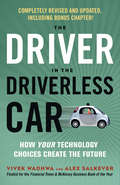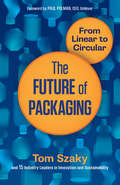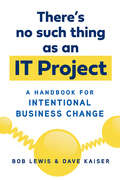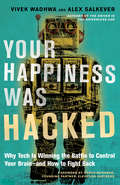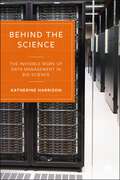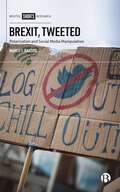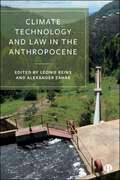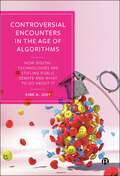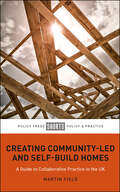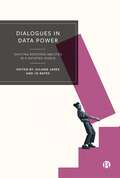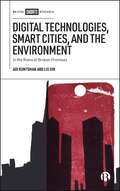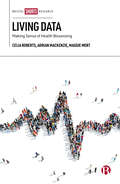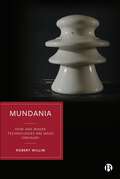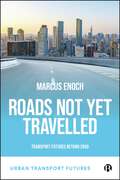- Table View
- List View
Iron Landscapes: National Space and the Railways in Interwar Czechoslovakia (Explorations in Mobility #5)
by Felix JeschkeThroughout the 1920s and 1930s, the newly formed country of Czechoslovakia built an ambitious national rail network out of what remained of the obsolete Habsburg system. While conceived as a means of knitting together a young and ethnically diverse nation-state, these railways were by their very nature a transnational phenomenon, and as such they simultaneously articulated and embodied a distinctive Czechoslovak cosmopolitanism. Drawing on evidence ranging from government documents to newsreels to train timetables, Iron Landscapes gives a nuanced account of how planners and authorities balanced these two imperatives, bringing the cultural history of infrastructure into dialogue with the spatial history of Central Europe.
Limits of Life: Reflections on Life, Death, and the Body in the Age of Technoscience
by Martin Eggen Mogseth & Fartein Hauan NilsenNew technologies and scientific imagination rearrange the boundary that we identify as the beginning and end of life. New techno-social constellations, such as the ever-increasing presence of digital avatars and genetic screenings, implore us to reconsider and transcend the existing definitions of life and death. Through a multidisciplinary approach, this volume explores how the limitations and perceived finality of life and death are reconstituted through engagements with modern technology.
Making Things Happen: Community Participation and Disaster Reconstruction in Pakistan (Catastrophes in Context #5)
by Jane Murphy ThomasDrawing on the Pakistan Earthquake Reconstruction and Recovery Project (PERRP), this volume explores the sociocultural side of post-disaster infrastructure reconstruction. As the latter is often fraught with delays and even abandonment—one cause being ineffective interactions between construction and local people—PERRP used anthropological and participatory approaches. Along with strong construction management, such approaches led to the rebuilding being completed on time. As disasters are increasing in number and intensity, so too will be the need for reconstruction, for which PERRP has lessons to offer.
Pacific Automobilism: Adventure, Status and the Carnival of Mobility, 1970–2015
by Gijs MomThe beginning of the 21st century has seen important shifts in mobility cultures around the world, as the West’s media-driven car culture has contrasted with existing local mobilities, from rickshaws in India and minibuses in Africa to cycling in China. In this expansive volume, historian Gijs Mom explores how contemporary mobility has been impacted by social, political, and economic forces on a global scale, as in light of local mobility cultures, the car as an ‘adventure machine’ seems to lose cultural influence in favor of the car’s status character.
Revealing the Invisible Mine: Social Complexities of an Undeveloped Mining Project (Pacific Perspectives: Studies of the European Society for Oceanists #8)
by Emilia SkrzypekExploring the social complexities of the Frieda River Project in Papua New Guinea, this book tells the story of local stakeholder strategies on the eve of industrial development, told largely from the perspective of the Paiyamo - one of the project’s so-called ‘impact communities’. Engaging ideas of knowledge, belief and personhood, it explains how fifty years of encounters with exploration companies shaped the Paiyamo’s aspirations, made them revisit and re-examine their past, and develop new strategies to move towards a better, more prosperous future.
The Global Life of Mines: Mining and Post-Mining in Comparative Perspective (Dislocations #37)
by Antonio Maria Pusceddu Filippo M. ZerilliResource extraction exists in diverse settings across the world and is carried out through different practices. The Global Life of Mines provides a comprehensive framework examining the spatial and temporal relationships between mining and postmining as interrelated and coexisting features within the global minescape. The book brings together scholars from various fields, such as anthropology, geography, sociology and political science, examining ethnographic case studies throughout the Americas (Bolivia, Brazil, Peru, USA), Africa (Democratic Republic of Congo) and Europe (Italy, Arctic Norway and Spain).
The Meanings of a Disaster: Chernobyl and Its Afterlives in Britain and France (Environment in History: International Perspectives #20)
by Karena KalmbachThe disaster at the Chernobyl nuclear power plant was an event of obviously transnational significance—not only in the airborne particulates it deposited across the Northern hemisphere, but in the political and social repercussions it set off well beyond the Soviet bloc. Focusing on the cases of Great Britain and France, this innovative study explores the discourses and narratives that arose in the wake of the incident among both state and nonstate actors. It gives a thorough account of the stereotypes, framings, and “othering” strategies that shaped Western European nations’ responses to the disaster, and of their efforts to come to terms with its long-term consequences up to the present day.
Water, Life, and Profit: Fluid Economies and Cultures of Niamey, Niger
by Sara Beth Keough Scott M. YoungstedtWater, Life, and Profit offers a holistic analysis of the people, economies, cultural symbolism, and material culture involved in the management, production, distribution, and consumption of drinking water in the urban context of Niamey, Niger. Paying particular attention to two key groups of people who provide water to most of Niamey’s residents - door-to-door water vendors, and those that sell water in one-half liter plastic bags (sachets) on the street or in small shops –, the authors offer new insights into how Niamey’s water economies affect gender, ethnicity, class, and spatial structure today.
Water, Life, and Profit: Fluid Economies and Cultures of Niamey, Niger
by Sara Beth Keough Scott M. YoungstedtWater, Life, and Profit offers a holistic analysis of the people, economies, cultural symbolism, and material culture involved in the management, production, distribution, and consumption of drinking water in the urban context of Niamey, Niger. Paying particular attention to two key groups of people who provide water to most of Niamey’s residents - door-to-door water vendors, and those who sell water in one-half-liter plastic bags (sachets) on the street or in small shops – the authors offer new insights into how Niamey’s water economies affect gender, ethnicity, class, and spatial structure today.
How to Get Ideas
by Jack Foster Larry CorbyThis new expanded second edition is an international bestseller with over 200,000 copies sold and translated into 15 languages that shows you—no matter your age or skill, your job or training—how to come up with more ideas, faster and easier. Jack Foster's simple five-step technique for solving problems and getting ideas takes the mystery and anxiety out of the idea-generating process. It's a proven process that works. You'll learn to condition your mind to become "idea-prone," utilize your sense of humor, develop your curiosity, visualize your goals, rethink your thinking, and overcome your fear of rejection. This expanded edition of the inspiring and enlightening classic features new information on how to turn failures to your advantage and how to create a rich, idea-inducing environment. Dozens of new examples and real life stories show that anyone can learn to get more and better ideas.
The Driver in the Driverless Car: How Our Technology Choices Will Create the Future
by Vivek Wadhwa Alex SalkeverA computer beats the reigning human champion of Go, a game harder than chess. Another is composing classical music. Labs are creating life-forms from synthetic DNA. A doctor designs an artificial trachea, uses a 3D printer to produce it, and implants it and saves a child's life.Astonishing technological advances like these are arriving in increasing numbers. Scholar and entrepreneur Vivek Wadhwa uses this book to alert us to dozens of them and raise important questions about what they may mean for us.Breakthroughs such as personalized genomics, self-driving vehicles, drones, and artificial intelligence could make our lives healthier, safer, and easier. But the same technologies raise the specter of a frightening, alienating future: eugenics, a jobless economy, complete loss of privacy, and ever-worsening economic inequality. As Wadhwa puts it, our choices will determine if our future is Star Trek or Mad Max. Wadhwa offers us three questions to ask about every emerging technology: Does it have the potential to benefit everyone equally? What are its risks and rewards? And does it promote autonomy or dependence? Looking at a broad array of advances in this light, he emphasizes that the future is up to us to create—that even if our hands are not on the wheel, we will decide the driverless car's destination.
The Driver in the Driverless Car: How Your Technology Choices Create the Future
by Vivek Wadhwa Alex SalkeverTech experts Vivek Wadhwa and Alex Salkever describe dozens of astonishing technological advances in this fascinating and thought-provoking book, which asks what kind of future lies ahead—Star Trek or Mad Max? Breakthroughs such as personalized genomics, drones, self-driving vehicles, and artificial intelligence could make our lives healthier, safer, and easier. On the other hand, the same technologies raise the specter of a frightening future—eugenics, a jobless economy, a complete loss of privacy, and ever-worsening economic inequality. Wadhwa says that we need to ask three questions about every emerging technology: Does it have the potential to benefit everyone equally? What are the risks and the rewards? And does it promote autonomy or dependence? This edition is updated throughout and includes a new chapter on quantum computing, which promises vastly increased processing times—and vastly increased security risks. In the end, our future is up to us; our hands may not be on the wheel, but we will decide the driverless car's destination.
The Future of Packaging: From Linear to Circular
by Tom SzakyOutstanding Book of the Year gold medalist and "Most Likely to Save the Planet" from the Independent Book Publisher Awards.Tom Szaky sets out to do the impossible – eliminate all waste. This book paints a future of a "circular economy" that relies on responsible reuse and recycling to propel the world towards eradicating overconsumption and waste. Only 35 percent of the 240 million metric tons of waste generated in the United States alone gets recycled, according to the Environmental Protection Agency. This extraordinary collection shows how manufacturers can move from a one-way take-make-waste economy that is burying the world in waste to a circular, make-use-recycle economy. Steered by Tom Szaky, recycling pioneer, eco-capitalist, and founder and CEO of TerraCycle, each chapter is coauthored by an expert in his or her field. From the distinct perspectives of government leaders, consumer packaged goods companies, waste management firms, and more, the book explores current issues of production and consumption, practical steps for improving packaging and reducing waste today, and big ideas and concepts that can be carried forward.Intended to help every business from a small start-up to a large established consumer product company, this book serves as a source of knowledge and inspiration. The message from these pioneers is not to scale back but to innovate upward. They offer nothing less than a guide to designing ourselves out of waste and into abundance.
There's No Such Thing as an IT Project: A Handbook for Intentional Business Change
by Bob Lewis Dave KaiserLearn how to stop pouring vast sums of money into technology projects that don't have a lasting impact by closing the communication gap between IT and leadership.Too many businesses miss opportunity after opportunity to design, plan, and achieve intentional business change. Why? Because they charter projects focused on delivering software products: IT projects. But as this groundbreaking book points out, there's no such thing as an IT project—or at least there shouldn't be. It's always about intentional business change, or what's the point?It's time to stop providing simplistic, one-dimensional, all-you-gotta-do panaceas. When the only constant in business is change, truly useful IT has to help you change instead of build solutions that are obsolete even before they are completed. IT consultant Bob Lewis, author of the bestselling Bare Bones Project Management, has joined forces with seasoned CIO Dave Kaiser to give you the tools you need. It's a multidimensional, relentlessly practical guide. Condensed to handbook length and seasoned with Lewis's trademark sardonic humor, it's an enjoyable and digestible read as well.Lewis and Kaiser take you step by step through the process of building a collaboration between IT and the rest of the business that really works. Insisting on intentional business change takes patience, communication, and courage, but it has a huge payoff. More to the point, insist on anything else and every penny you spend will be a wasted dime and a waste of time.
Your Happiness Was Hacked: Why Tech Is Winning the Battle to Control Your Brain--and How to Fight Back
by Vivek Wadhwa Alex Salkever"Technology is a great servant but a terrible master. This is the most important book ever written about one of the most significant aspects of our lives—the consequences of our addiction to online technology and how we can liberate ourselves and our children from it."—Dean Ornish, M.D. Founder & President, Preventive Medicine Research Institute, Clinical Professor of Medicine, UCSF, Author, The SpectrumTechnology: your master, or your friend? Do you feel ruled by your smartphone and enslaved by your e-mail or social-network activities? Digital technology is making us miserable, say bestselling authors and former tech executives Vivek Wadhwa and Alex Salkever. We've become a tribe of tech addicts—and it's not entirely our fault. Taking advantage of vulnerabilities in human brain function, tech companies entice us to overdose on technology interaction. This damages our lives, work, families, and friendships. Swipe-driven dating apps train us to evaluate people like products, diminishing our relationships. At work, we e-mail on average 77 times a day, ruining our concentration. At home, light from our screens is contributing to epidemic sleep deprivation. But we can reclaim our lives without dismissing technology. The authors explain how to avoid getting hooked on tech and how to define and control the roles that tech is playing and could play in our lives. And they provide a guide to technological and personal tools for regaining control. This readable book turns personal observation into a handy action guide to adapting to our new reality of omnipresent technology.
Behind the Science: The Invisible Work of Data Management in Big Science
by Katherine HarrisonAvailable Open Access digitally under CC-BY-NC-ND licence. Some of the largest quantities of data produced today occur as the result of experiments taking place at Big Science facilities. This book tells the story of a unique research journey following the people responsible for designing and implementing data management at a new Big Science facility, the European Spallation Source (ESS) in Lund, Sweden. It critically examines the idea of data as an absolute ‘truth’ and sheds light on the often underestimated, yet essential, contributions of these data experts. Providing a unique glimpse into the inner workings of Big Science, this book fills an important gap in science and technology studies and critical data studies.
Brexit, Tweeted: Polarization and Social Media Manipulation
by Marco BastosDissecting 45 million tweets from the period that followed the Brexit referendum, this book presents an extensive analysis of social media manipulation. The book examines emerging changes in partisan politics, nationalist and populist values, as well as broader societal changes that are feeding into polarization and echo-chamber communication. It pulls the curtain back on the techniques employed to interfere with, and potentially distort, the public discussion. Making complex data accessible to non-technical audiences, this unique post-mortem of the Brexit referendum contributes to our understanding of social media disinformation in the UK and beyond.
Climate Technology and Law in the Anthropocene
by Leonie Reins and Alexander ZaharAvailable open access digitally under CC-BY-NC-ND licence. As climate change accelerates, our window for action is closing. To stay within the "Anthropocene" - an epoch in which humankind as the dominant force shaping the planet retains a degree of control over the destructive processes it has unleashed - global warming must be kept below 2° Celsius. This book explores the unprecedented technological and legal changes required to achieve this. Featuring contributions from leading experts, the essays examine the intersection of technology, law, and environmental values, offering diverse viewpoints on navigating the Anthropocene. Revealing the controversies of rapid technological adoption and legal reform, this is a crucial analysis of a complex future whose many dangers for our society are barely understood.
Controversial Encounters in the Age of Algorithms: How Digital Technologies are Stifling Public Debate and What to Do About It
by Sine N. JustHow can we have meaningful public conversations in the algorithmic age? This book explores how digital technologies shape our opinions and interactions, often in ways that limit our exposure to diverse perspectives and fuel polarization. Drawing on the ancient art of arguing all sides of a case, the book offers a way to revive public debate as a source of trust and legitimacy in democratic societies. This is a timely and urgent book for anyone who cares about the future of democracy in the digital era.
Creating Community-Led and Self-Build Homes: A Guide to Collaborative Practice in the UK
by Martin FieldIn Creating Community-Led and Self-Build Homes, Martin Field explores the ways in which people and communities across the UK have been striving to create the homes and neighbourhood communities they want. Giving context to contemporary practices in the UK, the book examines ‘self-build housing’ and ‘community-led housing’, discussing the commonalities and distinctions between these in practice, and what could be learned from other initiatives across Europe. Individual methods and models of local practice are explored - including cohousing, cooperatives, community land trusts, empty homes and other intentional communities - and an examination is made of what has constrained such initiatives to date and how future policies and practice might be shaped.
Dialogues in Data Power: Shifting Response-abilities in a Datafied World
by Juliane Jarke and Jo BatesAvailable open access digitally under CC-BY-NC-ND licence. This book presents emerging themes and future directions in the interdisciplinary field of critical data studies, loosely themed around the notion of shifting response-abilities in a datafied world. In each chapter an interdisciplinary group of scholars discuss a specific theme, ranging from questions around data power and the configuring of data subjects to the intersection of technology and the environment. The book is an invaluable dialogue between disciplines that introduces readers to cutting edge arguments within the field. It will be a key resource for scholars and students who require a guide to this rapidly evolving area of research.
Digital Technologies, Smart Cities, and the Environment: In the Ruins of Broken Promises
by Adi Kuntsman Liu XinThe concept of smart cities holds environmental promises: that digital technologies will reduce carbon emissions, air pollution and waste, and help address climate change. Drawing on academic scholarship and two case studies from Manchester and Helsinki, this timely and accessible book examines what happens when these promises are broken, as they prioritise technological innovation rather than environmental care. The book reveals that smart cities’ vision of sustainable digital future obfuscates the environmental harms and social injustices that digitisation inflicts. The framework of “broken promises”, coined by the authors, centres environmental questions in analysing imaginaries and practices of smart cities. This is a must read for anyone interested in the connections between digital technologies and environment justice.
Living Data: Making Sense of Health Biosensing
by Celia Roberts Adrian MackenzieAs individuals increasingly seek ways of accessing, understanding and sharing data about their own bodies, this book offers a critique of the popular claim that ‘more information’ equates to ‘better health’. In a study that redefines the public, academic and policy related debates around health, bodies, information and data, the authors consider the ways in which the phenomenon of self-diagnosis has created alternative worlds of knowledge and practises which are often at odds with professional medical advice. With a focus on data that concerns significant life changes, this book explores the potential challenges related to people’s changing relationships with traditional health systems as access to, and control over, data shifts.
Mundania: How and Where Technologies Are Made Ordinary
by Robert WillimDigital services, platforms and arrangements are often promoted as smooth and convenient, smart or intelligent. When introduced, devices can appear utterly fascinating or awkward, even disquieting. Eventually, however, they soon disappear in the muddle of everyday life. This is how Mundania takes form. Based on original research, this book uses the concept of mundania to better understand technological change. Scholar-artist Robert Willim deftly unpacks the interplay between everyday life and the immense complexity of technological infrastructures. Offering imaginative new insights into our relationship with technology, this book will appeal to readers in a range of fields from science and technology studies and media studies to the arts.
Roads Not Yet Travelled: Transport Futures For 2050 (Urban Transport Futures)
by Marcus EnochWhat will the world be like in 2050? This book explores possible future worlds through eight speculative fiction stories. Taking in automation, big data, climate catastrophe and government dysfunction, each tale looks at the world through the eyes of people whose lives have been influenced by the societies they live in and the transport systems they live with. Asking important questions about our values and the role of transport in society, this book will encourage planners, policy makers, researchers and anyone interested in a positive future for public mobility to take the steps to ensure we get there.
